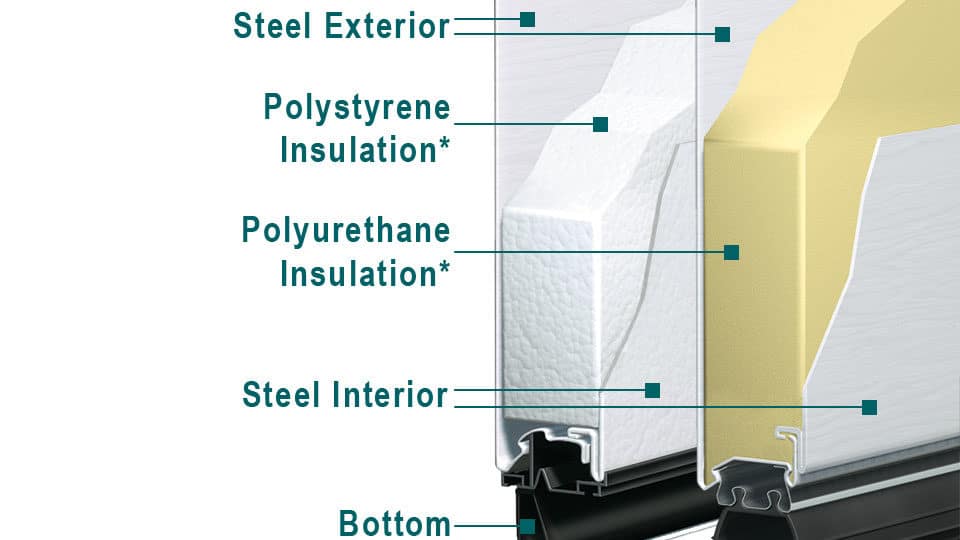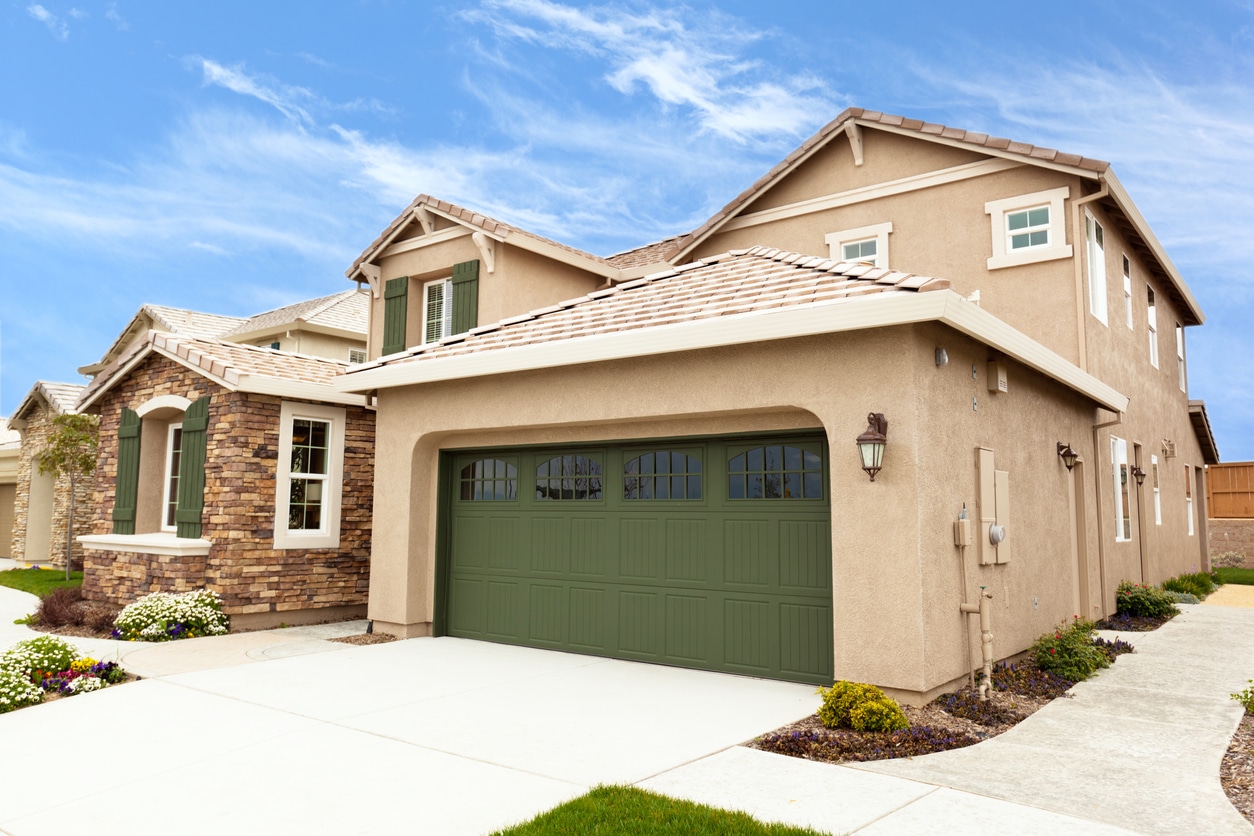
Insulated Garage Doors
Garage door insulation is an important topic to cover when researching garage doors. Insulation impacts the comfort of your garage and the price and quality of your door. We’re here to answer some of the most common questions around insulating your garage door. This article covers questions related to performance, price, and necessity in Southern California.
It depends on how you use your garage. Insulation regulates your garage temperature by providing a barrier to the outside weather. That matters if you want to be in your garage door with the door closed. If your garage door doubles as a playroom or a space for crafts/hobbies, it might make sense to opt for insulation. If you only park your cars and store lawn equipment, you might not opt for an insulated door.
Also consider where you have insulation above your garage and between your walls. Insulated garage doors won’t have much impact if the rest of your garage lacks insulation. Some new construction homes don’t insulate the garage to save money. Bob Vila published a thorough article on how to insulate your garage.
If your garage faces west, an insulated garage door might make sense. Besides windows, garage doors are the thinnest part of your exterior walls. At 2″ thick, garage doors are roughly 15% as thick as a brick wall. Adding insulation will shore up the thinnest section of your home. We recommend making your home more efficient during the hottest part of the day.
What are the benefits of an insulated garage door?
Insulated garage doors keep your garage quieter than non-insulated doors. In one test, Clopay’s Intellicore Insulation delivered a 3x quieter garage door than a non-insulated door. If noise reduction doesn’t matter, an insulated garage door may not be worth the extra amount.
Insulated garage doors deliver a more comfortable temperature inside your garage. Clopay measured the temperature inside and outside of a garage with one of their insulated doors. The insulated garage door averaged a 21 degree temperature difference. That’s significant when discussing extreme temperatures.
What is R-Value?
R-Value measures how well building materials resist thermal transfer. A good insulating product will keep heat from passing through the material. R-Value is a popular and accepted metric manufacturers use to show product efficiency. Product makeup and thickness contribute to the finished value.
The higher the R-Value, the better the product insulates. Yet, the efficiency gains are incremental past R-8. For example, a R-16 value does not mean it insulates twice as well. Based on data reported by Amarr, R-16 only improves energy efficiency by 5%. Click here to see the table Amarr uses on their website.
What should the R-Value be for garage doors?
As you can read in the tables below, R-Values range from 0 to a max of 19 for Amarr and 20 for Clopay. These values represent the range for single layer to five-layer garage doors. Your desire to have a quieter and more comfortable garage will determine which R-Value you should target. The higher the rating, the better it keeps weather from transferring into the garage.
Amarr garage door R-Values
Amarr garage doors deliver R-Values from NA to 19.4. The number of construction layers and presence of insulation dictates the energy efficiency. Single-layer construction will oftentimes not have an R-Value. The more layers, the higher the R-Value, resulting in increased efficiency.
What’s the most efficient Amarr garage door?
The triple-layer Amarr Olympus, with a R-Value of 19.40 is Amarr’s most efficient garage door. The OL3200 has a 27 gauge steel interior/exterior with polyurethane insulation.
Amarr garage door R-Values by layer & collections.
| Layers | Series | R-Value Range | Composition |
| One | Classica, Heritage, Hillcrest, Lincoln | NA | Steel |
| Two | Classica, Heritage, Hillcrest, Lincoln, Aluminum | 6.64 – | Steel or aluminum with polystyrene insulation |
| Three | Classica, Designer’s Choice, Heritage, Hillcrest, Lincoln, Olympus | 6.48 – 19.40 | Steel or aluminum with polystyrene or polyurethane insulation |
| Four | Carriage Court | 6.48 | Steel and polystyrene insulation |
| Five | By Design | 9.0 | Plywood, polystyrene insulation, framing wood, and overlay trim |
Clopay garage door R-Values
Clopay’s R-Value range tops Amarr, with a top metric of 20.4. The Canyon Ridge series has three layers, including polyurethane insulation.
Clopay garage door R-Values by layer & collections.
| Layers | Series | R-Value Range | Composition |
| One | Grand Harbor, Gallery Steel, Bridgeport Steel, Bridgeport Steel Ultra-Grain Finish, Modern Steel, Modern Steel Ultra-Grain & Lustra, Classic Steel, Classic Steel Ultra-Grain | NA | Steel |
| Two | Grand Harbor, Gallery Steel, Bridgeport Steel, Bridgeport Steel Ultra-Grain Finish, Modern Steel, Modern Steel Ultra-Grain & Lustra, Classic Steel, Classic Steel Ultra-Grain | 6.30 | Steel or aluminum with polystyrene insulation |
| Three | Coachman, Gallery Steel, Gallery Steel Ultra-Grain, Modern Steel, Bridgeport Steel, Bridgeport Steel Ultra-Grain, Modern Steel, Modern Steel Ultra-Grain & Lustra, Classic Steel, Classic Steel Ultra-Grain | 6.50 – 20.4 | Steel or aluminum with polystyrene or polyurethane insulation |
Which Clopay garage door has the highest R-Value?
The Clopay Canyon Ridge Carriage House with polyurethane is Clopay’s most efficient garage door. R-Value for this door tops out at 20.4.
What types of insulation are in garage doors?
Most garage door manufacturers use either polystyrene or polyurethane insulation. Polystyrene is the most common insulation, but it’s not as effective as polyurethane.

Polystyrene is a closed cell and rigid insulation that comes in panels or sheets. It’s available at retail stores and comes with DIY garage door insulation kits. Garage door makers install rigid sheets of polystyrene between construction layers. These doors are quieter and are more efficient than a non-insulated door. But, they are not as efficient as doors with foam injected polyurethane.
Polyurethane is a liquid insulation sprayed into open cavities. Because it starts as a liquid, it’s better than polystyrene at filling voids and bonding. This translates to a more efficient and stronger garage door. Garage doors with polyurethane insulation offer the best sound and temperature control.
Does insulation make my garage door stronger?
Denser polyurethane delivers better insulation than polystyrene, but both strengthen a garage door. The added rigidity of a 3 layer garage door helps your door withstand impacts better. From typical wear and tear to kids playing nearby, your garage door should last longer with a layer of insulation.
Since 1989, the team at Heritage Garage Door has provided high-quality garage door services to thousands of homeowners in Murrieta and surrounding Southern California areas. Whether you need garage door repairs or a new garage door, you can count on us to take care of your garage for years to come.
If you’re local to San Diego or a surrounding Southern California area, don’t hesitate to contact us for any of your garage needs.



